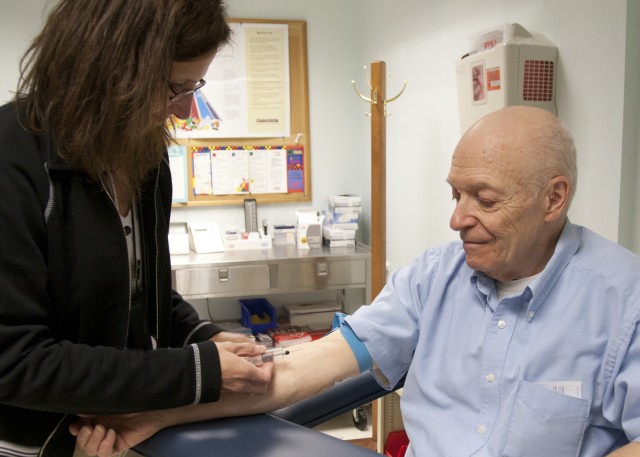PICATINNY ARSENAL, N.J. - The chance to save someone's life may never occur in a person's lifetime.
Even more uncommon is for an entire organization to share in that experience.
The Picatinny Civilian Welfare Council, or CWC, holds an annual blood test program, but it was not until last year that CWC chairperson Bridget Dollberg knew she was part of an extraordinary sequence of events.
Recently, Dollberg found out that in 1998 Raymond Seiz, who then was a supervisor in the Armament Technology Facility here, discovered that he had a disease that could kill him.
At the time, Seiz was 59 years old and had been getting his blood checked regularly. He often saw his regular physician.
For his blood tests, he would rely on the CWC's blood test program. But that year the results of the test made him aware of a statistic that would forever change his life.
One of the many tests the CWC program offers is a ferritin test that measures a protein that binds to iron in a person's blood.
Ferritin is found in the liver, spleen, skeletal muscles and bone marrow. Only a small amount of ferritin is supposed to be found in the blood.
The amount of ferritin in the blood shows how much iron is stored in your body.
Seiz discovered that he was suffering from hemochromatosis, a disease that attacks vital organs such as the liver.
Primary hemochromatosis is usually caused by a specific genetic problem that causes too much iron to be absorbed.
When people with this condition have too much iron in their diet, the extra iron is absorbed in the gastrointestinal tract and builds up in the body tissues, particularly the liver.
"I was dying of cirrhosis of the liver and didn't even drink alcohol," Seiz said.
Symptoms of hemochromatosis include fatigue, joint pain, weakness, excess urination, and weight loss.
In Seiz's case, his levels were two and a half times above the highest accepted range. He was in trouble.
One of the only treatments of hemochromatisis is through phlebotomy or the removal of blood from the body.
"Every week I had to have 500 cc's (cubic centiliters) of my blood taken out. I was essentially being bled out," Seiz said.
It took three months to complete the cycle. His blood was monitored quarterly for any spikes in ferritin levels.
With a low-iron, diet Seiz was able to steer clear of any recurrence. That was until last year.
In 2010, Seiz began the blood-draining process once again after another irregularity was detected.
It is doubtful that Seiz will ever be rid of hemochromatosis, but now he has a fighting chance.
"If the CWC didn't offer this test, I may not be here today," he said.
"There was no specific or visible reason to have my ferritin level checked with my regular doctor," Seiz said. "It virtually went undetected and I could have died. The CWC saved my life."
Medical professionals suggest that you should see your physician regularly and have testing done annually.
"It is important to have routine visits with your primary care provider with the appropriate routine blood work since the ideal situation is to identify any disease or illness before it presents symptoms," said Dr. James Bilello, who operates Picatinny's Operational Health Clinic.
"The reason for this is that many if not most medical issues have better outcomes if caught early. This way a treatment plan or procedure can prevent the disease from getting worse. In some cases, as in routine colonoscopy screening, a cure can easily be achieved," Bilello said.
The Picatinny CWC will hold its annual blood test program June 7-9 in the Lindner Conference Center in building 93 from 7:30 a.m. to 11 a.m.
Five specific tests are offered:
CBC - $20
Lyme - $19
PSA - $13
Ferritin - $11
Thyroid - $10
The Picatinny CWC has existed for 31 years. The council is responsible for annually establishing and managing an approved budget that supports, through funding requests, the allocation of funds for morale, welfare and recreation activities for Picatinny.
"The blood test is an 'MWR type' of event that the council chose to hold to support the interests of the Picatinny community," Dollberg said.
The CBC test requires 12 hours of fasting. However consuming black coffee, tea or water is allowed.
People who want their blood tested should bring a completed registration form, a legal size self-addressed stamped envelope and cash or check made payable to CWC.
Forms for the event can be downloaded at http://www.pica.army.mil/mwr/MWR/CivilianWelfareCouncil/cwchomepage.htm


Social Sharing